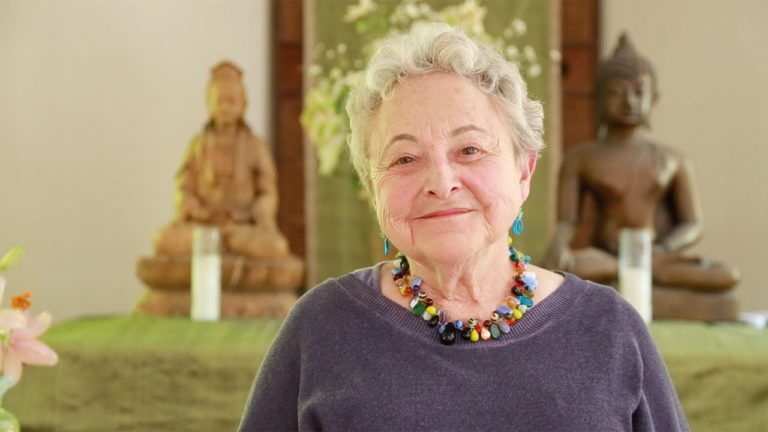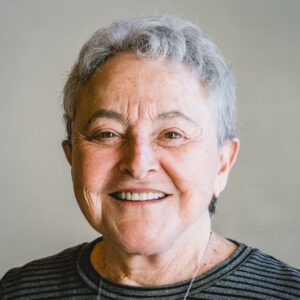Sylvia Boorstein
Spirituality Is Enfolded Into the Act of Living
“Sometimes the pain of the world seems incomprehensible. And if there’s anything that balances it, it’s wonder at the world, the amazingness of people.” Mindfulness meditation teacher Sylvia Boorstein gives counsel on finding joy and spiritual practice embedded in the rhythms of everyday life.

Guest

Sylvia Boorstein is a mother, grandmother, Jewish-Buddhist teacher, psychotherapist and a founding teacher of Spirit Rock Meditation Center in Woodacre, California. Her books include That’s Funny, You Don’t Look Buddhist, It’s Easier Than You Think, Happiness Is an Inside Job, and Making Friends with the Present Moment.
Transcript
Krista Tippett, Host: Sylvia Boorstein was one of those young Jewish seekers of the 1960s and 1970s who helped to bring Buddhism to mainstream culture in the West. And she’s another 21st-century hybrid spiritual being. Over the years, she’s reintegrated Jewish teachings and rituals in an enlivening, organic interplay with Buddhist teachings and practice.
Dr. Sylvia Boorstein: You have to know that I grew up in a post-Depression household. Both my parents had jobs and I’m an only child. And my parents went off to work, so my grandmother did a great deal of the mothering, and she was very, very solicitous, so that I remember her bathing and washing and dressing me and making braids and preparing the kinds of foods that I liked. The only thing that she was not moved to respond to was the coming and going of childhood bouts of “I’m not happy.” I’d say, “But I’m not happy.” And she’d say, “Where is it written” — my grandmother was not a learned woman in that sense, but it’s an ethnic thing to use that Talmudic turn of phrase — “Where is it written that you’re supposed to be happy all the time?” And I actually think it was the beginning of my spiritual practice — that life is difficult. Then 40 years later, I learned that the Buddhists said the same thing, that life is inevitably challenging, and how are we going to do it in a way that’s wise and doesn’t complicate it more than it is just by itself?
Ms. Tippett: To the question of raising children as human beings who are kind, who have a heart for the world, in a world that’s troubled — when you and I met on a panel in Southern California two years ago, you told a story about leading mindfulness teaching sessions. You told a story about a man who at the end of it said, “I’m frightened to go back out into the world. I feel so vulnerable. In here I’m safe, but I don’t know how I can be out in the world and be vulnerable.” As a parent, a version of that goes through my mind. How much do I expose my children to? How do I teach them to be kind and open to the world’s pain and vulnerability? I want them to be safe, and yet I actually want them to be tough out in that scary world at the same time.
Dr. Boorstein: I don’t remember exactly that moment, but I’m sure it happened because it comes up often. People will come and spend a week at a retreat center or a weekend or however many days, and then they do say, here everyone is safe and it’s quiet and to go out I feel too vulnerable. It gives me a chance to say, really, I don’t think we can become too vulnerable. I’m waiting for the time that the whole world is suddenly too vulnerable. Then we all look around and say, we all have to stop. We have to share. We have to make sure there is enough to eat all over the world. We can teach each other our ways and tell each other our hopes and dreams, but we can’t kill each other. That doesn’t work. And we can’t despoil the earth as we are doing. So in a sense that’s a half of an answer, Krista. That’s what I’d say to an adult who’s leaving a retreat.
To a parent I say, as a child is growing up, inevitably they live in the world. We only have a certain amount of control as parents about how much the TV is on and what’s on the TV and how much they are confronted by the pain of the world. Sometimes the pain of the world seems incomprehensible and unbearable to me. And I think if there’s anything that balances it, it’s wonder at the world, the amazingness of people, how resilient they are, how people will take care of others they don’t know. If somebody falls or someone’s in trouble in a public place, people take care of them. Human beings have that ability. I don’t think they have to learn it. They don’t have to have lessons. I think we’re a companionable species, for the most part.
So to be able to look at human beings and say, life is amazing. The sun came up in the exact right place this morning. Celebrate seasons and birthdays and holy days. Here we are again, at another time in another season, and there’s that great cosmos out there to look at. Our ancestors looked at the same stars. I keep in myself a sense of amazement. I tell my grandchildren, “Look at this moon. It’s a three-day moon. It’s the best moon. It’s better than a two-day moon. It’s my favorite moon.” And if I show that to them, they begin to think, “Oh, it’s my favorite moon, a three-day moon.” These are balances. When the Buddha taught about needing to see the suffering in the world so that we could respond with com- passion, he also talked about the preciousness of life and the need to take care of it.
Ms. Tippett: This is also making me think about how we need to be attentive to what our children can teach us, as well as what we want to impart to them because some of this they know and they actually know more immediately than we do. We lose it. I remember watching something terrible on the news the other day. And my daughter said, “So many beautiful lives in the world, and this is what they focus on.”
Dr. Boorstein: They don’t make good headlines. You know, it would be wonderful — I don’t know if it would be commercially viable — if there were a channel that had all wonderful things in the news.
Ms. Tippett: I don’t know. It’s hard to make good news sexy. It is. I think about this a lot as a journalist. But maybe it’s like kindness. Kindness is the stuff of moments, but it can be absolutely transformative in moments. Beautiful lives are transformative in moments. But we have to train ourselves to look for them.
Dr. Boorstein: There are two things that you just said. One of them is that when we are really paying attention — which is what mindfulness is — we really connect with other people. Lots of times, for reasons of rush or whatever, even with our own children, we’re not completely there. There is something about really paying attention.
What seems most clear to me is that children pick up what their parents live. My friend Jim Finley, who’s a Christian contemplative psychotherapist, said, “I learned to pray sitting next to my mother in church.” And what I understood from him is that he didn’t learn the words of the prayer; he learned the feelings out of her body as she sat there.
Spirituality doesn’t look like sitting down and meditating. Spirituality looks like folding the towels in a sweet way and talking kindly to the people in the family even though you’ve had a long day. Or even saying to them, “Listen, I’ve had such a long day, but it would be really wonderful if I could just fold these — I’d really love folding these towels quietly if you all are ready to go to bed without me,” or whatever it is. People often say to me, “I have so many things that take up my day. I don’t have time to take up a spiritual practice.” And the thing is, being a wise parent or a spiritual parent doesn’t take extra time. It’s enfolded into the act of parenting.







Reflections